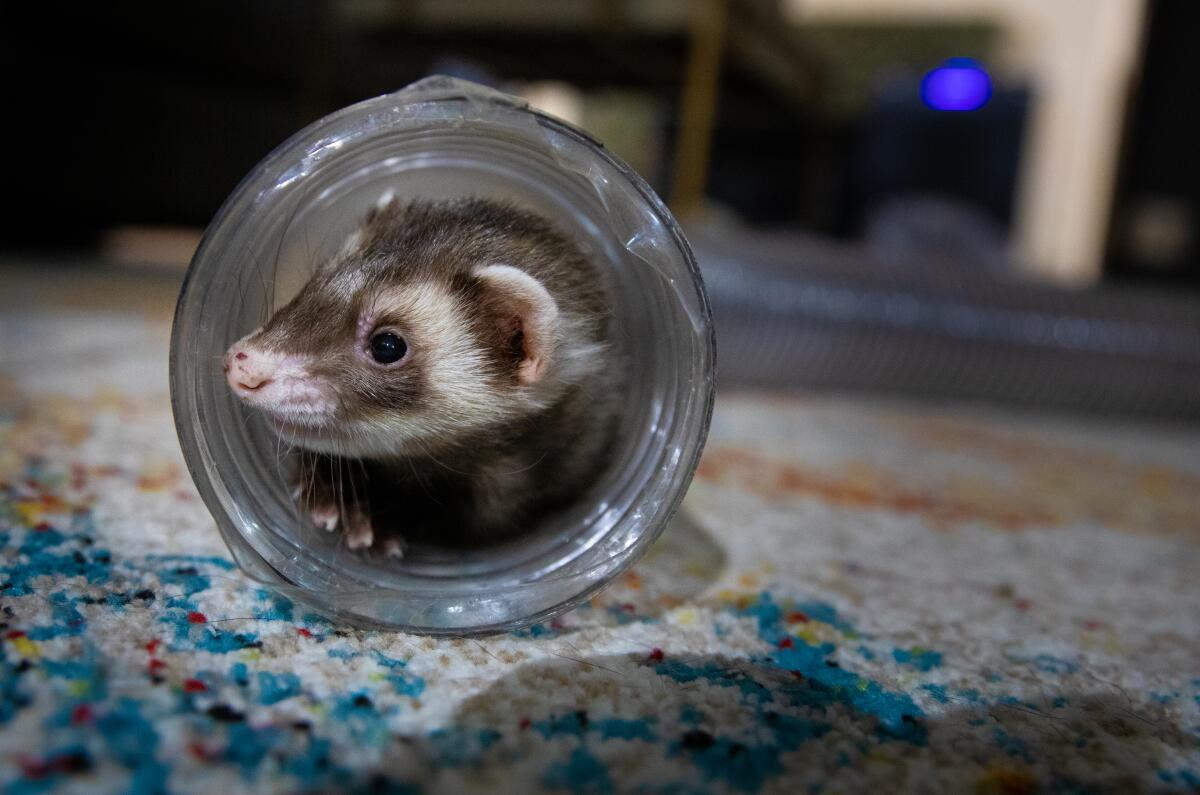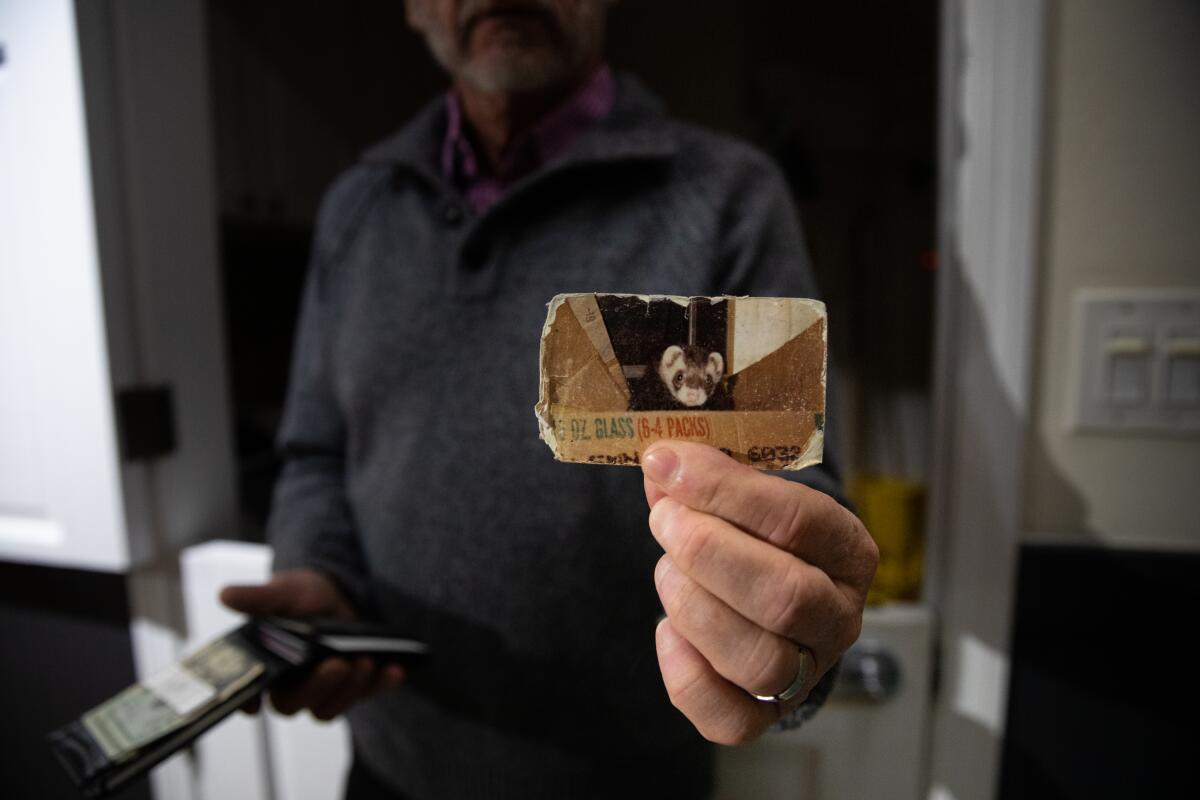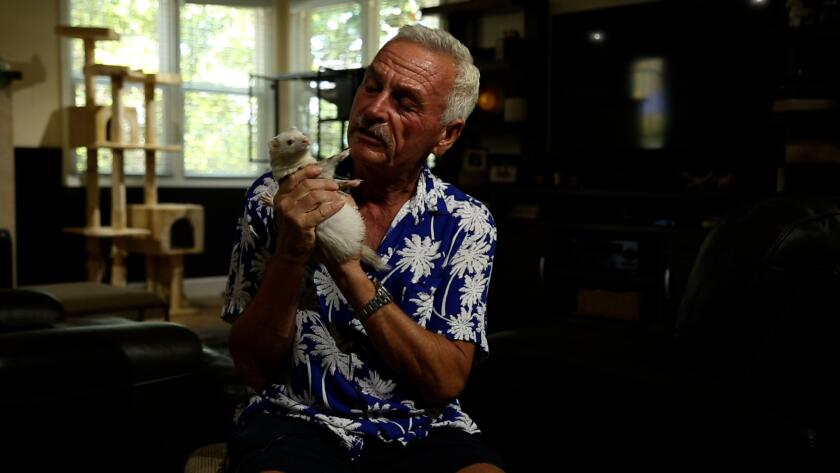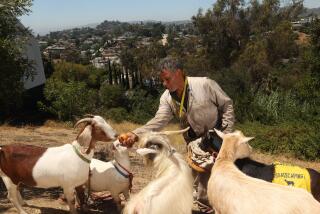One man is fighting to end California’s ban on ferrets. Is time running out?

- Share via
LA MESA, Calif. — Noodle was the first to tumble out of the cage, roused by a series of belly rubs and head scratches.
She scampered around the lower-level den, bouncing around a pair of La-Z-Boy recliners, a white-and-gray flash with her long back hunched.
Then two more ferrets emerged from the cage. Merlin, living up to his masked “bandit” markings, chased Astro, who shimmied through a crinkly plastic tunnel in a frantic effort to get away. Watching him interact with the humans in his life, Astro gave every indication that he would rather cuddle with them than tussle with his cage mate.
“They’re so much fun and bring me so much joy,” said Pat Wright, who keeps the three ferrets in his San Diego-area home, along with a corgi and an English shepherd. “How anyone can see these pets as a threat is absurd.”
But the state does see ferrets as a threat; it’s illegal to keep them as pets in California, a fact that has defined much of Wright’s adult life.
In nearly three decades of ferret activism, Wright has gone to jail, run for political office, lobbied legislators, collected thousands of signatures and battled decades of rejection and apathy. One of his ferrets, Rocky, had to be euthanized after he bit a TV cameraman at a legalization rally.
If all social protest movements need a martyr, the free-the-ferrets campaign in California may finally have found one: Rocky.
Wright came closest to his goal in 2004, when the state Legislature passed a bill legalizing ferrets in California. But then-Gov. Arnold Schwarzenegger vetoed it.
Through it all, Wright, a freelance marketer, has owned a succession of pet ferrets. He carries a faded photo in his wallet of his first, Chester, who died in 1994. Over the years, he has owned two dozen, among them Gonzo, Pooka, Daisy, Raleigh, Simba and Jasper. He’s spent tens of thousands of dollars on critical surgeries, and he’s mourned their deaths for months after spreading their ashes in his ample backyard.
But Wright’s quest may soon be coming to an end. He is 63 and thinking of moving to Mexico, where ferrets are legal.
Ferrets require a 100% meat diet — the ultimate keto — and have a musky odor that, owners say, ranges from corn chips to grape juice to old books. When they’re pleased or excited, they emit a noise called a dook — a rapid-fire chortling.
Because of their strong predatory drive, flexible spines and ability to slip through narrow spaces, they have been used by humans to hunt rodents and other small animals for centuries.

Owners insists they are sweet, independent-minded and cuddly. Shadow Hills resident Scott Schneider, a 43-year-old acquaintance of Wright’s, fell in love with the creatures during his sophomore year at MIT, where a roommate kept one as a pet. The mammal was playful when it wasn’t sleeping between 16 and 20 hours day, Schneider said, ideal for a dorm that did not permit cats or dogs. Schneider eventually owned two ferrets — Puck and Mayhem — for nearly 10 years.
Ferrets grow to be around 18 inches long and weigh 1 to 4 pounds. Noodle, Astro and Merlin, who wiggle and fidget in Wright’s arms as he gathers and hugs them, do not present the hallmarks of a dangerous predator.
Most states regard ferrets as a domesticated species, unlike, say, weasels and wolverines, other members of the mustelid family, but they’ve been banned in California for almost 90 years. The agricultural lobby in California, fearing that ferrets could form feral packs that would endanger crops and livestock, took a stand in 1933, and the state Department of Agriculture officials agreed. Today, the penalty for ownership includes up to six months of imprisonment in county jail along with a fine of up to $1,000.
- Share via
Hawaii is the only other state that bans ferrets; they’re also not welcome in New York City, where former Mayor Rudolph W. Giuliani, on his radio show, once famously referred to a ferret owner as “deranged” because of his “excessive concern” for ferret legalization.
Ferret lovers have tried to get the state of California to change their status for decades.
In 1995, state Sen. Quentin L. Kopp introduced a legalization bill. The part-time attorney from San Francisco, 93, vividly remembers opposition from the Department of Fish and Game. The agency introduced “gripping” testimony in a Senate committee meeting from a 14-year-old Nevada girl who had been mauled as an infant by a ferret.
“The parents had owned a ferret and I believe they left their daughter unattended in a crib and, boy, she came into that committee meeting missing an eye,” Kopp said.
The bill died in committee on a 3-6 vote.
Some concerns about ferrets stem from a 1988 report from the California Department of Health Services, which said that when ferrets play, they launch mock attacks and could end up biting humans. The report also said ferrets can carry rabies and can escape into the wild, where they prey on small animals such as chickens and rabbits. The current Fish and Game Code, first adopted in 1957 and amended in 1974 and 2005, lists ferrets as “undesirable and a menace to native wildlife and or the agricultural interests of the state.” They are restricted along with bobcats, jaguars, cheetahs and bears.
During a recent call, a California Department of Agriculture spokesperson referred ferret questions to the Department of Fish and Wildlife. That department did not respond to requests for comment.
Michelle Hawkins, a professor of avian and exotic animal medicine and surgery at UC Davis, thinks a ferret ban in Hawaii is reasonable, since islands’ ecosystems are easily threatened by invasive animals. But in California, escaped ferrets would have a negligible effect, she said. Most are spayed or neutered, and they typically live five to seven years.
Feral cats, which live longer, are a bigger threat for spreading rabies, she said, adding that she is not aware of any recent ferret attacks on humans. Nonetheless, because of the risk of bites, the U.S. Centers for Disease Control and Prevention does not recommend ferrets for families with children younger than 5.

Pat Wright is 5 feet 6 and slightly built with silver hair. His voice is soft, his attire modest. On a recent afternoon, he was dressed in a collared shirt, wool sweater and black jeans. Jim Smotherman says his husband is usually mild-mannered and nonconfrontational, in contrast to his fierce pro-ferret activism in public.
They’ve been together 26 years — even though Smotherman dislikes noise and barely tolerates Wright’s rambunctious animals. Ferrets can be trained to use a litter box, but on a recent afternoon one of them pooped on the kitchen floor. Wright cleaned up the mess as he snatched Noodle to prevent her from pouncing on Smotherman’s freshly washed shirts neatly folded in a low-lying plastic hamper.
Wright acquired his first ferret in 1988.
He was 29 and at a loss for what to do with his life after leaving his job as a credit account processor at a hardware outlet. He’d studied computer science in college but was starting to realize that the subject was completely wrong for him.
While soul searching, Wright realized he wanted a pet that was more affectionate than his two standoffish cats. His San Diego apartment complex prohibited dogs, so he followed the lead of a former co-worker and purchased Chester from a pet store in Yuma, Ariz.
“He was the most intelligent and personable ferret I ever had,” Wright said. “He was like a little dog, a little Lassie.”
And that’s when an activist was born.
In 1992, Wright ran for state Assembly because the incumbent, Democrat Mike Gotch, had ignored his request to sponsor a ferret legalization bill. Wright’s aim was not necessarily to win but to pull enough votes from Gotch to take him down in a four-person race.
Wright, a Libertarian, ended with 3.6% of the vote — and Gotch won.
Two years later, a ferret bill landed on the Assembly floor but was adamantly opposed by the most powerful legislator in the room — Speaker Willie Brown, a Democrat. The bill died.
By then, Wright had started Ferrets Anonymous, an advocacy group that he ran from 1993 to 1998 and would grow to 14,000 e-newsletter subscribers under its new internet identity of LegalizeFerrets, a nonprofit organization.

Grass Valley resident and ferret lover Bill Phillips occasionally worked alongside Wright and counted him as a dedicated and trustworthy ally. A family law attorney, Phillips ran the California Domestic Ferret Assn. for 25 years until 2000, when “he could only bang his head against the wall for so long” and resigned.
Phillips said California Fish and Wildlife would hold commission and committee meetings throughout the state that many advocates had trouble attending. That wasn’t the case for Wright.
“He was everywhere and very industrious, to say the least,” said Phillips, 75. “Meetings were in Santa Barbara one month and Sacramento two months later, and he was there with stacks of data and a go-getter attitude.”
But Wright’s zeal was also problematic.
His first brush with the law came in 1997, when he was convicted of misdemeanor ferret possession and sentenced to 160 hours of community service and a $100 fine. Someone in the neighborhood turned him in.
The following year, officials insisted on euthanizing Rocky, who had sunk his tiny teeth into a cameraman’s finger at a “Ferret Freedom” walk. Wright said he lost 10 pounds and was haunted by nightmares.
In 2000, a San Diego police officer showed up at Wright’s apartment with a search warrant after a 4-year-old girl was bitten by one of Wright’s ferrets during a rally in Balboa Park.
Wright held a kitchen knife and refused commands to drop it.
The officer later testified that he had his gun drawn and his finger on the trigger before Wright finally dropped the knife. Wright said he “panicked” and “kept remembering Rocky.”
He was convicted of possessing a ferret and brandishing a knife, serving 17 days in jail while his four ferrets stayed at a safe house in Mexico. (Wright said friends took them across the border.) However, some of his fellow ferret activists declined to rally behind him, feeling he had crossed a line and hurt the movement.
Wright kept going. In 2002, he ran for lieutenant governor. In his ballot statement, he listed his occupation as “ferret legalization coordinator.” He expressed outrage at the judge who had sentenced him to jail.
“The real reason I am running for Lt. Governor is to fight the ... pervasive, sentiment expressed by the judge in my case,” he wrote. “It is an attitude that has lead to many horrific tragedies throughout history. It says ‘don’t question authority.’ It says ‘just follow your orders.’ It’s an attitude that’s the antithesis to freedom and responsibility.”
But Wright’s quest remained quixotic.
Schwarzenegger, who became governor in 2003, seemed as though he might be someone to appreciate ferrets. In the 1990 film “Kindergarten Cop,” he portrayed an undercover policeman posing as a teacher who brought a ferret to show his class.

“What happened to your dog?” a child asks.
“This is not a dog. This is a ferret,” Schwarzenegger replies, clutching the creature in one hand and kneeling to give the students a close-up.
But life did not imitate art. “I love ferrets,” the governor said in his veto message. “I costarred with a ferret in ‘Kindergarten Cop.’ However, this bill is far too bureaucratic.”
Schwarzenegger added that advocates should have conducted an environmental impact report to determine if ferrets “are detrimental to the health and safety of California citizens and the environment.”
Wright, through LegalizeFerrets, tried for small victories as well. His hometown of La Mesa issued a proclamation calling for ferret legalization in 2017 after he petitioned the City Council. He pushed for a similar gesture in nearby Encinitas, where his former high school classmate Tony Kranz sat on the City Council.
On March 20, 2019, a handful of residents and experts pushed back against Wright and ferret legalization. Christina Simokat, a lecturer of environmental studies and biology at Cal State San Marcos, wrote a protest letter that stated nonnative ferrets “could easily become an invasive species in our temperate climate, killing native wildlife and competing with them for scarce resources.”
Ultimately, the City Council did not take a formal vote on the matter.
“Pat was convincing and passionate, but you could also see was he disappointed,” Kranz said in a recent interview. “This has been his pet project for decades, and to keep running into obstacles must be frustrating.”
By this time, many ferret advocates in the state were exhausted by failures — and by their status as a running joke. Phillips, the former executive director of the California Domestic Ferret Assn., said few very people cared, a lesson that led him into retirement.
“We would bring hundreds of signatures and pages of support and documentation to state legislators and Fish and Game personnel and it became apparent that they never read them,” Phillips said. “They just weren’t interested. That was depressing.”
In the meantime, the United California Ferret Alliance suspended its legislative efforts.
Wright too is on the verge of quitting — but not before one final push to alter the state of the roughly 100,000 ferrets in California, according to his estimate.
He is gathering signatures to place a proposition on the November ballot that would reclassify ferrets as domestic animals.
If he doesn’t get 623,212 signatures by June 30, he may pack up Noodle, Merlin and Astro and head to Puerto Vallarta, Mexico.
“We’re going to give it a try,” he said. “Again.”
More to Read
Sign up for Essential California
The most important California stories and recommendations in your inbox every morning.
You may occasionally receive promotional content from the Los Angeles Times.










